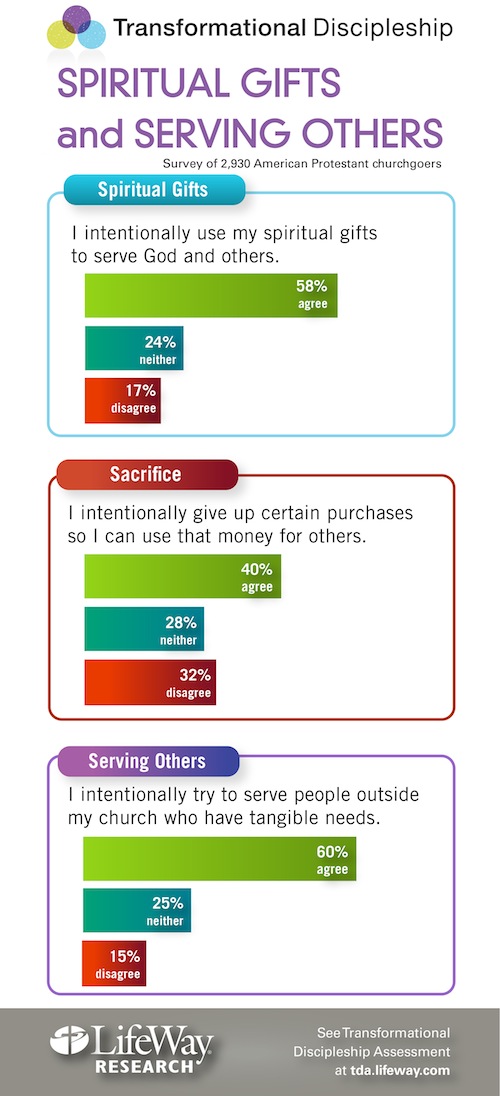
New Discipleship Research: Selflessness Leads to Spiritual Maturity
Throughout the year, we have been releasing new research in support of Transformational Discipleship. This latest research is on “Serving God and Others”– one of eight attributes of discipleship that consistently show up in the lives of believers who are progressing in spiritual maturity.
Service doesn’t just happen in a church. It must be modeled and encouraged. As we look at the breakdown of attributes and correlated disciplines, the data shows that praying expectantly, getting involved in the community and discipling others fosters a posture of serving. As such, disciples are serving in, through, and beyond their churches for the cause of Christ.
Service and activism have become popular in our culture today, especially among younger adults. However, most of this benevolent activity is fairly low-level involvement that does not cost the giver much. The midrange responses on the Serving God and Others attribute reveals lots of good intentions and some occasional actions but much lower intentionality, consistency or sacrifice.
Serving clearly impacts growth, and the study shows that individuals who have positive scores for Serving God and Others have higher scores in the other seven attributes of the Transformational Discipleship study, as well.
For example, scores for Sharing Christ jump 24 percent when individuals have positive Serving God and Others’ scores and 51 percent for individuals with the highest Serving God and Others scores. Likewise, positive responses in the other seven attributes of discipleship correlate with higher scores in Serving God and Others.
Growth leads to service and serving leads to growth – it’s deeply connected. Positive scores in Bible Engagement result in a 17 percent increase in scores for Serving God and Others compared to those who do not have positive scores for Bible Engagement.
We saw most say they were serving in some way, but far too many are sitting down on the job – particularly when the Bible says everyone should ‘…use it to serve others, as good managers of the varied grace of God’ (1 Peter 4:10; HCSB). There is a huge gap between this passage and most churches’ practice.
From the release (read the full article here):
The survey shows 58 percent of Protestant churchgoers in the United States agree with the statement: “I am intentionally putting my spiritual gift(s) to use serving God and others.” Seventeen percent disagree with the statement.
A greater percentage of respondents indicate they look for opportunities to serve others in the community. Asked to respond to the statement: “I intentionally try to serve people outside my church who have tangible needs,” 60 percent agree – although only 17 percent strongly agree. Fifteen percent disagreed with the statement.
Churchgoers indicate much lower agreement related to sacrificial giving. Just 9 percent of churchgoers strongly agree with the statement: “I intentionally give up certain purchases so I can use that money for others.” Thirty percent somewhat agree and 32 percent disagree.
Approximately a quarter of respondents selected “neither agree nor disagree” as their answer for the three statements.
I shared a pre-release version of this data at the Q Conference, which was focused on serving other for the common good. Statistically, growing Christians serve and serving Christians grow. Sojourners reported on the data here. I’m encouraged to see the statistical connection, but am not surprised considering the biblical connection.
These findings on serving God and others are part of the largest discipleship study of its kind. Results from each of the eight attributes of spiritual maturity will continue to be released over the coming months.
To help pastors, churches and individuals measure spiritual development, LifeWay Research used the study’s data to develop a questionnaire for believers, called the Transformational Discipleship Assessment (TDA). This online evaluation delivers both individual and group reports on spiritual maturity using the eight factors of biblical discipleship. The TDA also provides helpful and practical suggestions on appropriate next steps for spiritual development.

Tags: Connect, Discipleship, Ed Stetzer, Multiplication, Transformational Discipleship, Transformational Discipleship Assesment













